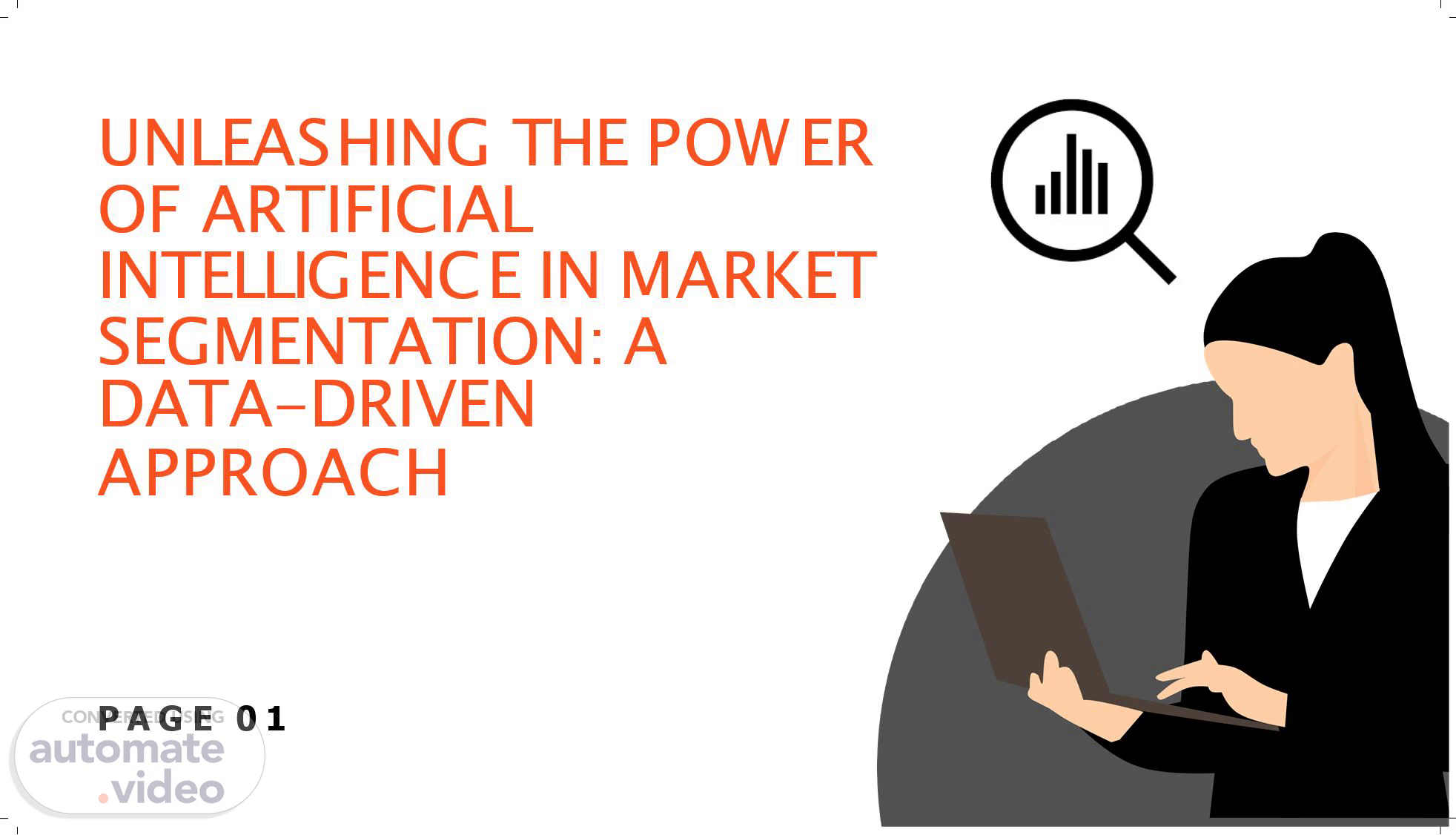
Page 1 (0s)
[Audio] UNLEASHING THE POWER OF ARTIFICIAL INTELLIGENCE IN MARKET SEGMENTATION: A DATA-DRIVEN APPROACH.
Page 2 (11s)
[Audio] MARKET SEGMENTATION Marketing segmentation is a process of grouping the customer into number of different divisions on the bases of similar characteristics. It is a customer oriented philosophy. A market segment consists of a identifiable group within a Market .Every product is not required by everybody. Therefore marketer must group the customer on the bases of similar characteristics or uniform response to a concentrated either on one or more groups depending upon his capability instead of launching his product in the open market . The Power of Artificial Intelligence Artificial Intelligence can analyze vast amounts of data to identify patterns and insights that would be impossible for humans to detect. This makes it an incredibly powerful tool for market segmentation..
Page 3 (1m 4s)
[Audio] DATA-DRIVEN APPROACH A data-driven approach to market segmentation involves using AI algorithms to analyze customer data, such as demographics, behavior, and preferences. This can help businesses identify unique segments and tailor their marketing strategies accordingly. BENEFITS OF AI IN MARKET SEGMENTATION Using AI for market segmentation can lead to more accurate targeting, increased customer satisfaction, and higher profits. It can also help businesses stay ahead of their competition by identifying new market opportunities..
Page 4 (1m 43s)
[Audio] NEED OF SEGMENTATION IN MARKETING The marketing concept emphasizes the importance of understanding customers and surpassing their needs in a more effective way compared to competitors. Since customers have varying needs, it is uncommon to be able to satisfy all customers by treating them similarly..
Page 5 (2m 4s)
[Audio] MASMARKETS VS TARGET The term "mass market" refers to treating the market as a whole and providing the same marketing strategy to all customers, considering them as a uniform group. The goal is to reach as many customers as possible rather than targeting a niche or specific segment of the population..
Page 6 (2m 25s)
[Audio] MASS VS TARGET MARKET The target market, however, acknowledges the variety of customers and avoids attempting to cater to all of them with the same product or service. The goal is to recognize diversity within a target market and improve marketing effectiveness. AI can be used to by companies to create personalized experiences for their customers, optimize their campaigns, and gain actionable insights. AI helps marketers understand consumer behavior through machine learning algorithms that track and analyze user data..
Page 7 (3m 1s)
[Audio] TYPES OF SEGMENTATION SYSTEM Demographic Segmentation: Divides the market based on demographic factors such as age, gender, income, education, marital status, occupation, and family size. Geographic Segmentation: Categorizes customers based on their geographic location, including factors like country, region, city, climate, or urban/rural areas. Psychographic Segmentation: Groups customers based on their psychological and lifestyle characteristics, including values, interests, attitudes, personality traits, and behavior. Behavioral Segmentation: Segments customers based on their behavior, such as buying habits, brand loyalty, usage frequency, and readiness to buy..
Page 8 (3m 55s)
[Audio] CHALLENGES OF AI IN MARKET SEGMENTATION One of the biggest challenges of using AI for market segmentation is ensuring the accuracy and reliability of the data. Businesses also need to be careful not to rely too heavily on AI and neglect the importance of human intuition and creativity..
Page 9 (4m 16s)
[Audio] AI TOOLS FOR MARKET SEGMENTATION There are many AI tools available for market segmentation, including clustering algorithms, decision trees, and neural networks. Each tool has its own strengths and weaknesses and should be chosen based on the specific needs of the business..
Page 10 (4m 36s)
[Audio] Real-World Examples Many businesses are already using AI for market segmentation with great success. For example, Amazon uses AI to recommend products to customers based on their purchase history and browsing behavior..
Page 11 (4m 53s)
[Audio] Future of Market Segmentation As AI technology continues to evolve, it is likely that market segmentation will become even more sophisticated and accurate. Businesses that embrace this technology will have a competitive advantage in the marketplace..
Page 12 (5m 12s)
[Audio] CONCLUSION Artificial Intelligence is revolutionizing market segmentation. By using a data-driven approach and the right AI tools, businesses can unlock new insights and opportunities that were previously impossible to detect..
Page 13 (5m 29s)
[Audio] Thank You Very Much!. Thank You Very Much!.